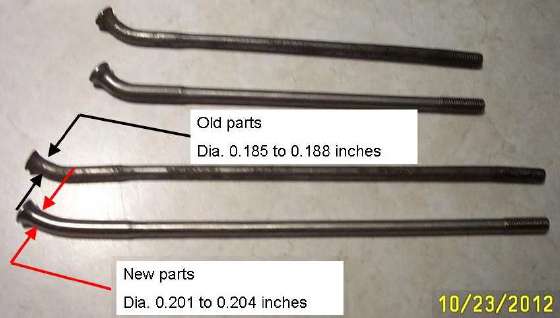The MGA With An Attitude
Wire Wheel PARTS That No Longer Fit - WL-124
This article started with a Faulty Parts report and quickly escalated into an issue of updated parts sold under original part numbers that no longer fit the original application. This situation always makes a mess of things for anyone looking for original type parts to restore a car to original specifications. In this case, anyone ordering spokes to repair an original wire wheel may get new replacement spokes that do not fit in the original wire wheel hub.

This situation was discovered with parts purchased from Moss Motors, but it may well involve many other suppliers as well, as they may source parts from a common manufacturer. The little detail is that spokes for original Dunlop 48-spoke wire wheels are 0.187-inch (3/16") nominal diameter, but the current replacement spokes are 1/64" larger (0.203" diameter). The follow-up story is that current replacement wheels are being made with these larger spokes, so the new spokes are correct as service parts for the new wheels. This situation could be entirely legitimate if the new wheels and associated replacement parts were given new part numbers, and it was noted that the new parts do not work with original wheels. That is, the new parts supersede old parts as complete assemblies only,
The problem is that the new non-original wheels and the new non-standard replacement parts are being sold under the original part numbers. Major BUMMER. This simply does not work in the real world. If you now order new spokes for your original wire wheels, the spokes will not fit through the holes in the the original splined hubs. The supplier's advice is to drill the holes in the hub 1/64" larger to fit the new replacement spokes. To me that is a major faux pas (blunder, to put it mildly).
It has always been my advice to never modify (bastardize) a perfectly good original part to accommodate a faulty mating replacement part. This is another good example why this is good advice. If you drill out the hole to fit the oversize spoke, you end up with different spoke sizes in the same wheel. While this may be functional it will likely look funny on close inspection, is certainly not original, and would not pass concours show standards. Even worse, if one day you need to replace the spoke again, and you then get the correct (smaller) spoke for the application, the hole will be too large for the new spoke. This might result in immediate failure of the connection when tightening the new spoke in place, or would certainly result in failure of the spoke connection while driving a short time later. In essence, modifying the splined hub to accommodate the incorrect spoke will forever ruin what was a perfectly good original part.
The apparent solution then is to replace the entire wheel with a new replacement wheel that contains all new matching parts (and live with the fact that it is not concours correct). Of course if you want matching wire wheels on your car this means buying a complete set of five new wheels ($1200.00 maybe), all for want of a few $5 spokes in original size. I like to think of this as a marketing scam designed to part a fool and his hard earned money.
Now for the originality enthusiasts and also the thrifty among us, it is time to lobby the vendors to correct the situation. When selling the new wheels with larger spokes, the wheel assemblies and spokes and hubs should all be assigned different part numbers, and these parts should be noted as not suitable as replacements for original wheel parts. The other step is to also source replacement spokes with the correct specifications as repair parts for the original wheels under original part numbers.
Meanwhile, before ordering replacement spokes for your wire wheels you should measure the diameter of your existing spokes near the head end, and then ask the vendor what is the diameter of their replacement spokes. If they don't know or refuse to tell you, don't buy the parts from that vendor. If they tell you that you can return the parts if they don't fit, they are effectively drafting you to be their field tester in lieu of any effective in-house Quality Assurance program. Not only do you get to work for free inspecting their parts, but you also get to pay shipping charges both ways, and hope that you might be able to get your money back from the original purchase. This all sucks (to put it mildly), and it is no way to do business in the real world. I don't have enough time in my life to do business that way, so when I can identify Faulty Parts I will do so, and I am happy to tell the world where not to buy the bad parts.
|
